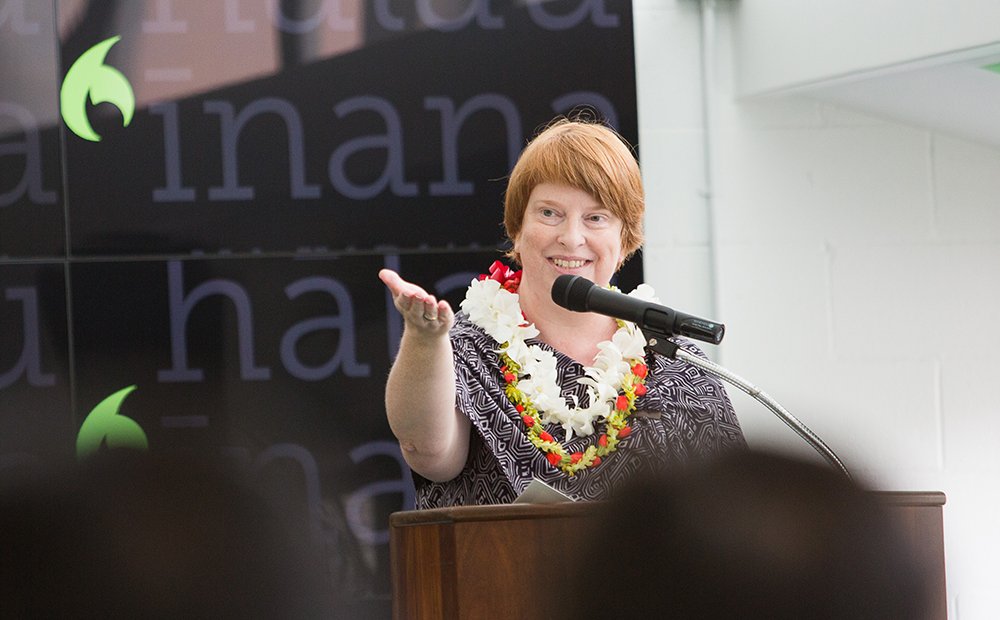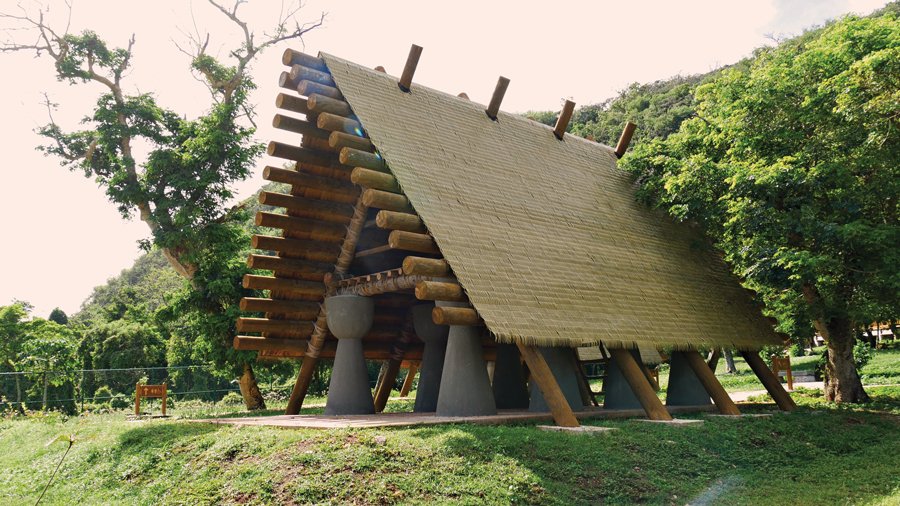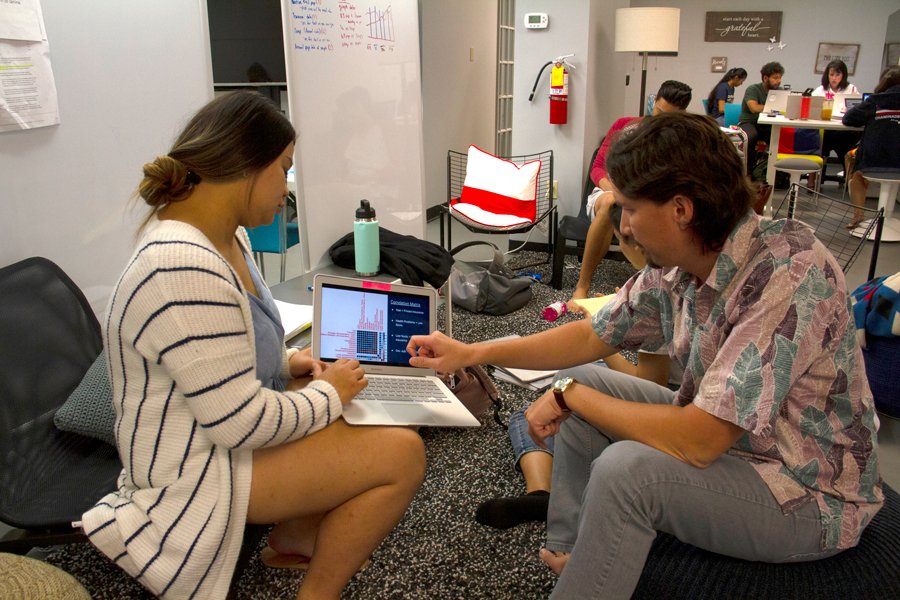People & Programs
Faith Singer-Villalobos
Related Links
The Kuleana Spirit
Summer immersion program builds capacity for data science in Hawai'i and the Pacific region
Kuleana is a uniquely Hawaiian value and practice which embodies responsibility to self, community, and the ‘aina’ (land). At Chaminade University, a federally designated Native Hawaiian-serving university in Hawai'i, kuleana is part of the institution’s DNA.
It’s with this spirit that 21 undergraduate students at Chaminade University on the island of Oahu, 92 percent of whom are Native Hawaiian, undertook a month-long summer immersion experience in the field of data science.

Helen Turner, Chaminade’s vice president for Strategy and Innovation, has a 20-year history of working with the Native Hawaiian and Pacific Islander communities through research, education, and outreach programs. The university’s recent push into the field of data science (starting Hawai'i’s first Bachelor of Science program in this area) is the latest STEM initiative led by Turner.
“For us, data science in the Pacific is about empowerment,” Turner says. “Data problems are at the heart of our fundamental regional challenges in healthcare, sustainability, equity, and social justice. Training a data workforce in Hawai'i will provide new capacity for stakeholders from grassroots organizations to agencies and businesses — that’s our vision.”
Chaminade, TACC, and Georgia Tech joined forces to launch the new project, called SPICE (Supporting Pacific Indigenous Computing Excellence), with a goal of teaching data science skills and broadening participation, equity, and representation in STEM. The program is supported by NSF.
Data Science as a Route to Social Good
“Most people have a passion. Most people care about something significant, something that they have a personal connection to,” says Kelly Gaither, director of Health Analytics at TACC and Associate Professor in Women’s Health at the Dell Medical School. “When you have a personal connection, it’s like a glue. It allows other concepts that you need to stick. In the absence of that glue, students may not realize they’d be happy working in computer science or data science because of the way it’s taught and presented to them.”
During the summer immersion program, each student chose a problem they really care about that affects their community, such as health, homelessness, the environment, and sustainable energy.
"By empowering young people’s voices and embracing culture, we’ll start to see a different level of digital and data science literacy because it has a relevance and attachment to something that is important to everyone."
Chenoa (Nona) Faletoi loves biology and medicine. She lives in American Samoa and wants to go back there to work. When she looks ahead, she sees herself as a pharmacist or an epidemiologist. “American Samoa has a lot of health disparities that are fairly unique,” says Faletoi.
Her project looked at rates of obesity, diabetes, and hypertension — all factors that contribute to life expectancy. In American Samoa, Faletoi found that the population growth rate is decreasing, which can only be attributed to increased death rates, decreased birth rates, or both.
“I learned that in American Samoa, they don’t document much data,” says Faletoi. “But without the data, we can’t improve our community. I now believe after this program that you need data to address difficult issues.”
The SPICE program has significant potential to impact the way students view their futures. “All of the students want to see a future for themselves on their islands. What we want to do is give them the flexibility to choose where they want to be, knowing that they have an employment path on the island,” Turner says.

With the largest wealth gap in the nation, high rates of incarceration, and high rates of illness and health disparity, Hawai'i has a compelling need to address social justice issues. Students of Hawaiian descent have something they want to fix because they see the inequality every day in their families and their communities.
“This is about how agency over information is empowering, and if these students are going to be the future leaders of their community, then they’re going to do it by wielding data as their primary weapon,” Turner says.
Nilo Espinoza, a student in the SPICE program who also attended TACC’s Research Experiences for Undergraduates program, is pursuing a degree in Civil Engineering from the University of Guam. “I chose this field because I want to help build a more sustainable island,” he says. “I’m trying to make Guam a better place to live.”
Espinoza looked at the impacts of the built environment of the indigenous Chamorro culture of Guam. For hundreds of years, the Chamorro people lived in open, community-oriented thatched huts. In 1962, Typhoon Karen wiped out 95 percent of these structures. The Federal Emergency Management Agency mandated concrete construction going forward. These concrete structures could withstand a typhoon, but the people lost the cultural and social values that existed in the ancient housing design.
“Knowing that there is a change in the culture, we can go back and see where the problem stemmed from and try to bring back some of what the Chamorro culture really is,” Espinoza says. Espinoza hopes to bring the SPICE program to Guam.

“I want the younger generations to learn about data science using all of the resources available at TACC,” Espinoza said. “I’m applying coding, computation, and visualization skills in my project. Coding is the biggest challenge because it isn’t taught in our curriculum,” he says.
How Can Hawai'i and Data Science Inform the World?
Hawaiian society has valued the process of inquiry, empirical research, and experimentation for generations. However, in more modern times, the scientific endeavor of the U.S. became exclusionary to some people who want to remain connected to their culture, family, and community, according to Turner.
“That is not a starting place from which to be successful,” Turner says. “What we decided to do at Chaminade is instead of trying to change the students, we decided to change the way the science is approached.”
“When you see students expressing themselves as cultural and scientific individuals in the same breath, that’s when you know you’re on the right path.”
TACC’s Gaither believes that the SPICE program is the right model for the future.
“There’s something special in working on problems that are relevant to the entire community,” Gaither says. “By empowering young people’s voices and embracing culture, we’ll start to see a different level of digital and data science literacy because it has a relevance and attachment to something that is important to everyone.”
SPICE supporters: NSF, TACC, the Kamehameha Schools, Howard Hughes Medical Institute, the Irwin Foundation, Extreme Science and Engineering Discovery Environment (XSEDE). Watch a video about SPICE at useta.cc/SPICE.

